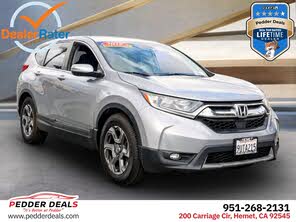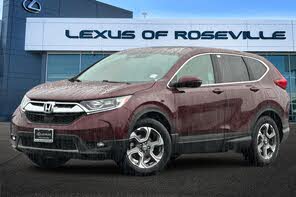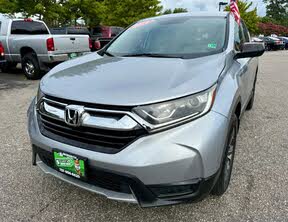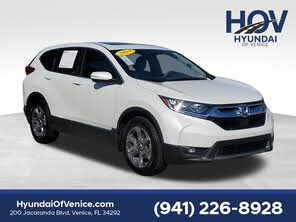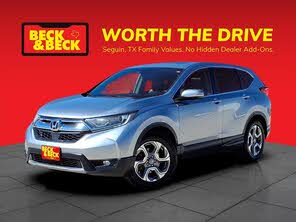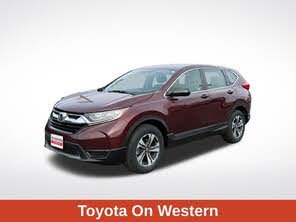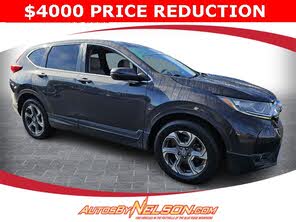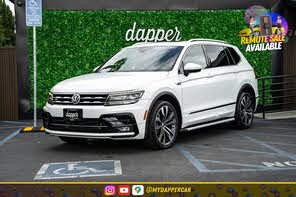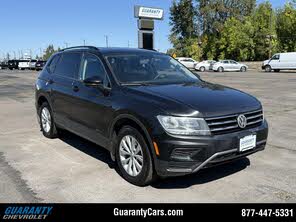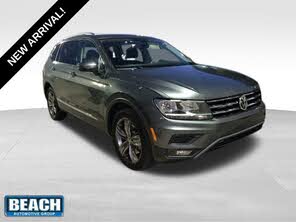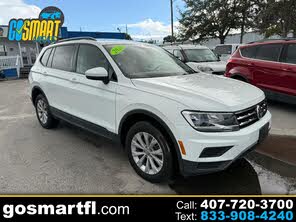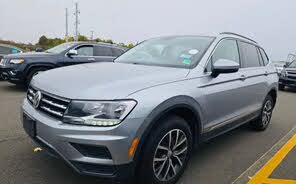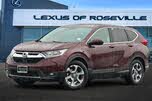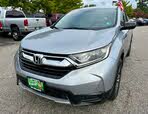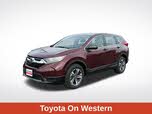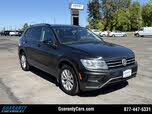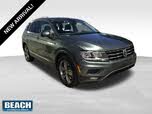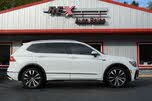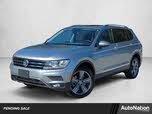2019 Honda CR-V vs 2020 Volkswagen Tiguan
Overview | |
MSRP$24,450 | MSRP$24,945 |
Listings1793 | Listings907 |
Ratings & Reviews | |
User Reviews | User Reviews |
Expert reviews8.0 out of 10 | Expert reviews7.7 out of 10 |
Pros
Cons
| |
2019 Honda CR-V Reviews SummaryRefined, roomy, and historically reliable, the Honda CR-V has earned its status as one of the best selling vehicles in America. This is a safe SUV, too, and it returns good fuel economy while delivering lively performance. There are few reasons to cross the 2019 Honda CR-V off of your shopping list, and numerous reasons to drive one home from the dealership. | |
2020 Volkswagen Tiguan Reviews SummaryThe Volkswagen Tiguan is one of only two compact crossover SUV’s that currently offer third-row seating. (And the other is the hopelessly outdated Mitsubishi Outlander.) To fit the extra pair of surprisingly spacious seats, VW made the Tiguan much larger than average for its competitive set—which suits a vehicle that fills big shoes in VW dealerships. With five trim levels and prices that stretch from just under $26,000 to a bit over $40,000, the Tiguan is the German brand’s best-selling vehicle in the U.S. | |
No video found | |
Popular Features & Specs | |
Engine2.4L 184 hp I4 | Engine2.0L 184 hp I4 |
Drive TrainFWD | Drive TrainFWD |
Seating Capacity5 | Seating Capacity7 |
Horsepower184 hp @ 6400 rpm | Horsepower184 hp @ 4400 rpm |
MPG City26 | MPG City22 |
MPG Highway32 | MPG Highway29 |
Engine | |
Engine Name2.4L 184 hp I4 | Engine Name2.0L 184 hp I4 |
Torque180 lb-ft @ 3900 rpm | Torque221 lb-ft @ 1600 rpm |
Horsepower184 hp @ 6400 rpm | Horsepower184 hp @ 4400 rpm |
DrivetrainFWD | DrivetrainFWD |
Fuel Economy | |
MPG City26 | MPG City22 |
MPG Highway32 | MPG Highway29 |
Interior | |
Seating Capacity5 | Seating Capacity7 |
Safety | |
Front Crash Overall5 | Front Crash Overall4 |
Side Crash Overall5 | Side Crash Overall5 |
Dimensions & Capacity | |
Cargo Space39.2 cu ft | Cargo Space12.0 cu ft |
Curb Weight3307 lbs | Curb Weight3757 lbs |
Height66.1 in | Height66.3 in |
Length180.6 in | Length185.1 in |
Width73.0 in | Width72.4 in |
Wheelbase104.7 in | Wheelbase109.8 in |
Maximum Payload1388 lbs | Maximum Payload1124 lbs |
Number of doors4 | Number of doors4 |
Maximum Towing Capacity1500 lbs | Maximum Towing Capacity1500 lbs |
Overview | ||
MSRP | $24,450 | $24,945 |
Listings | ||
Ratings & Reviews | ||
User reviews | ||
Expert reviews | 8.0 out of 10Read full review | 7.7 out of 10Read full review |
Pros & cons | Pros
Cons
| |
Summary | Refined, roomy, and historically reliable, the Honda CR-V has earned its status as one of the best selling vehicles in America. This is a safe SUV, too, and it returns good fuel economy while delivering lively performance. There are few reasons to cross the 2019 Honda CR-V off of your shopping list, and numerous reasons to drive one home from the dealership. | The Volkswagen Tiguan is one of only two compact crossover SUV’s that currently offer third-row seating. (And the other is the hopelessly outdated Mitsubishi Outlander.) To fit the extra pair of surprisingly spacious seats, VW made the Tiguan much larger than average for its competitive set—which suits a vehicle that fills big shoes in VW dealerships. With five trim levels and prices that stretch from just under $26,000 to a bit over $40,000, the Tiguan is the German brand’s best-selling vehicle in the U.S. |
Video | No video found | |
Popular Features & Specs | ||
Engine | 2.4L 184 hp I4 | 2.0L 184 hp I4 |
Drive Train | FWD | FWD |
Seating Capacity | 5 | 7 |
Horsepower | 184 hp @ 6400 rpm | 184 hp @ 4400 rpm |
MPG City | 26 | 22 |
MPG Highway | 32 | 29 |
Engine | ||
Engine Name | 2.4L 184 hp I4 | 2.0L 184 hp I4 |
Torque | 180 lb-ft @ 3900 rpm | 221 lb-ft @ 1600 rpm |
Horsepower | 184 hp @ 6400 rpm | 184 hp @ 4400 rpm |
Drivetrain | FWD | FWD |
Fuel Economy | ||
MPG City | 26 | 22 |
MPG Highway | 32 | 29 |
Interior | ||
Seating Capacity | 5 | 7 |
Safety | ||
Front Crash Overall | 5 | 4 |
Side Crash Overall | 5 | 5 |
Dimensions & Capacity | ||
Cargo Space | 39.2 cu ft | 12.0 cu ft |
Curb Weight | 3307 lbs | 3757 lbs |
Height | 66.1 in | 66.3 in |
Length | 180.6 in | 185.1 in |
Width | 73.0 in | 72.4 in |
Wheelbase | 104.7 in | 109.8 in |
Maximum Payload | 1388 lbs | 1124 lbs |
Number of doors | 4 | 4 |
Maximum Towing Capacity | 1500 lbs | 1500 lbs |
The 2019 Honda CR-V stood out with its four distinct trim levels: LX, EX, EX-L, and Touring, each available in FWD or AWD configurations. With prices ranging from $24,350 to $34,150, excluding destination charges, buyers had plenty of choices to suit their tastes. Accessories from dealerships varied in usefulness, adding to the customization potential of the CR-V.
The base model, CR-V LX, came with aesthetically pleasing standard 17-inch aluminum wheels, which enhanced its somewhat basic appeal. Higher trims like the EX, EX-L, and Touring boasted body-color trim, 18-inch wheels, and rear privacy glass, lending an upscale appearance to the vehicle. While the CR-V’s front styling was a matter of personal taste, its rear design was often praised for its upscale look. Overall, the Honda CR-V was anticipated to receive a facelift for the 2020 model year to address its front-end design.
The interior of the CR-V showcased quality, from the materials and construction to the arrangement of controls. A two-tone tan-over-black interior treatment in some test vehicles added to the premium feel. Despite the presence of hard plastics, they neither looked nor felt cheap, contributing to an overall perception of value for money.
Volkswagen completely revamped the Tiguan for the 2018 model year, and by 2020, it maintained its position as a stylish, conservatively German compact crossover SUV. The new Tiguan prioritized its formerly diminutive size and brought its pricing more in line with competitors like the Honda CR-V and Toyota RAV4.
The Tiguan’s design was modern, featuring clean, simple lines characteristic of Volkswagen’s contemporary style. With a flat logo adorning a horizontal grille that connected the headlights, the Tiguan exhibited a no-nonsense approach to design, devoid of any adventurous or cartoonish elements.
However, inside the 2020 Tiguan, the utilitarian design was evident. Volkswagen, once known for its superior interiors, took a cost-cutting approach with the Tiguan, resulting in dull surfaces and hard black plastics. The cockpit might have been considered “simple” at best, but “boring” was likely a more accurate description. Nevertheless, VW’s focus on electronics brought standout features like an optional digital dashboard and a glass-covered touchscreen infotainment system, reminiscent of a high-quality smartphone experience.


















In 2019, the Honda CR-V came with two powertrain options. The base LX model had a 2.4-liter 4-cylinder engine producing 184 horsepower at 6,400 rpm and 180 pound-feet of torque at 3,900 rpm, paired with a continuously variable transmission (CVT) that provided power to either the front or all four wheels.
Higher trims (EX, EX-L, and Touring) were equipped with a turbocharged 1.5-liter 4-cylinder engine. This engine delivered a modestly higher 190 horsepower at 5,600 rpm and 179 lb-ft of torque between 2,000 and 5,000 rpm, also paired with a CVT. The turbocharged engine offered better responsiveness and acceleration and improved fuel efficiency compared to the base engine.
Although both engines had similar power outputs, the turbocharged engine had its concerns, particularly in very cold weather and short-distance driving, which could cause fuel to mix with engine oil. Honda addressed this issue with an oil and software change in certain states. Another issue was with vehicle batteries, as some owners reported problems which Honda was investigating.
Driving dynamics of the CR-V were also impressive. Its dual-pinion, variable-ratio electric steering provided light and effortless handling at low speeds and increased heft at higher velocities, complemented by a comfortable and stable ride. The CR-V managed to achieve 27.7 mpg in tests, slightly below the EPA’s combined estimate of 29 mpg.
The 2020 Volkswagen Tiguan, on the other hand, was powered by a turbocharged 2.0-liter four-cylinder across all variants. This engine produced 184 horsepower and a robust 221 pound-feet of torque, aimed at enhancing torque rather than horsepower. The Tiguan could be driven with either FWD or AWD, with the latter costing an additional $1,300.
Weighing in significantly heavier than the CR-V, at 3,757 pounds for front-wheel drive models and 3,847 pounds for all-wheel drive models, the Tiguan’s extra bulk impacted its performance. The engine provided minimal turbo lag and a snappy throttle response; however, passing on the highway with a fully loaded Tiguan required patience.
The Tiguan’s suspension system was designed for comfort, absorbing shocks well, even on rough two-track lanes. Although it had a longer wheelbase which affected its nimbleness, the Tiguan offered a soft and comfortable driving experience. Its “sport” driving mode slightly firmed up the steering but did not drastically change the overall light feel. Despite its size, the Tiguan offered a quiet cabin experience on highways, with minimal wind and engine noise.
The 2019 Honda CR-V provided a comfortable environment for families, though the absence of a height-adjustable front passenger seat was a noted drawback. This lack of adjustment often led to discomfort for shorter passengers who preferred a higher seating position. Conversely, the driver benefited from a 12-way power-adjustable seat across all trims except the base LX. Heated front seats were also standard on all but the LX trim, with the option for a heated steering wheel at an additional cost.
Rear seat passengers enjoyed ample space, with creature comforts like air vents and 2.5-amp USB ports. The backseat easily accommodated taller adults, and three children could fit comfortably across the rear bench. Storage space in the CR-V was another highlight, with a large glove box, sizable center console bin, and generous cargo space.
The CR-V offered 39.2 cubic feet of cargo space behind the rear seats, expandable to 75.8 cubic feet when the rear seats were folded down. This spaciousness was nearly on par with larger models like the Honda Passport, setting a high standard for compact crossovers.
In contrast, the 2020 Volkswagen Tiguan excelled in practicality. The Tiguan's second-row seats could slide up to seven inches, making the third row usable for smaller adults and children. Front-wheel-drive models featured a standard third row, while it was an optional extra for AWD models at $595.
Access to the third row was made easier by a simple latch mechanism on the outboard second-row seats, which allowed for forward tipping and sliding. Although the third row lacked generous headroom and positioned the seat cushions close to the floor, it still offered more space than many larger vehicles' third-row options.
The third-row seats in the Tiguan folded flat, creating a cargo capacity of 65.7 cubic feet. Without the third row, the Tiguan's cargo capacity increased to 73.5 cubic feet. This was significantly more than many of its competitors, though still slightly less than the Honda CR-V's 75.8 cubic feet.
The Tiguan's front seats offered plenty of space and comfort, with a wide beam providing ample hip and shoulder room. The SUV's generous glass areas and seating position also contributed to a spacious feeling, making it seem larger than it was. This was a notable feature for those transitioning from a larger vehicle, though it might be overwhelming for buyers accustomed to smaller vehicles.
The 2019 Honda CR-V came equipped with notable infotainment and safety technologies, starting with the EX trim. It featured a 7-inch touchscreen display, Bluetooth connectivity, Apple CarPlay, Android Auto, text messaging capability, and HondaLink connected services. Higher trims offered navigation and a premium sound system as standard.
While Honda had improved its infotainment systems, the CR-V’s system still lacked certain features like a tuning knob. The 7-inch screen was also considered small, particularly without menu shortcut buttons on either side. The infotainment system was sometimes more distracting than useful, with voice activation requiring specific prompts and occasional malfunctions that required a vehicle restart.
The 2020 Volkswagen Tiguan featured the MIB II infotainment system, soon to be replaced by MIB3 for the 2021 model year. Despite this, the current system already stood out as one of the best in the market. The base S trim came with a 6.5-inch touchscreen display, in line with what was typical in the segment. Higher trims boasted an 8-inch capacitive touchscreen that was exceptional for a non-luxury SUV, with a responsive, user-friendly interface.
The Tiguan also featured USB-C and USB-A ports for charging, with wireless charging available on higher trims. VW's Digital Cockpit, a fully customizable digital instrument panel, was available on top SEL trims, providing an innovative use of cockpit space.
The 2019 Honda CR-V offered a comprehensive suite of advanced safety features under the Honda Sensing package, standard on all but the base LX trim. This included adaptive cruise control, forward-collision warning with automatic emergency braking, lane-departure warning and lane-keeping assist, and road-departure mitigation. Higher trims also benefited from a blind-spot-monitoring system with rear cross-traffic alert.
The CR-V received praise for its crash protection, earning a Top Safety Pick designation from the IIHS. However, its headlight performance was rated just Acceptable, preventing it from achieving the highest Top Safety Pick Plus rating.
For 2020, Volkswagen enhanced the Tiguan’s standard safety offerings with forward-collision warning, automatic emergency braking, blind spot monitoring, and rear cross-traffic alert across all trims. Other advanced features like adaptive cruise control and lane-keeping assistance were limited to the top SEL trim. This made the base and mid-tier models of the Tiguan less competitive in terms of standard safety equipment compared to rivals such as the CR-V and RAV4.
The Tiguan came with the Car-Net telematics package, offering remote connectivity and real-time information services. This included emergency assistance, automatic accident reporting, and anti-theft features under a subscription plan. The IIHS rated the Tiguan a Top Safety Pick, but only for top-tier models equipped with LED headlights. Halogen headlights on most other trims were rated poorly.
CarGurus highlights
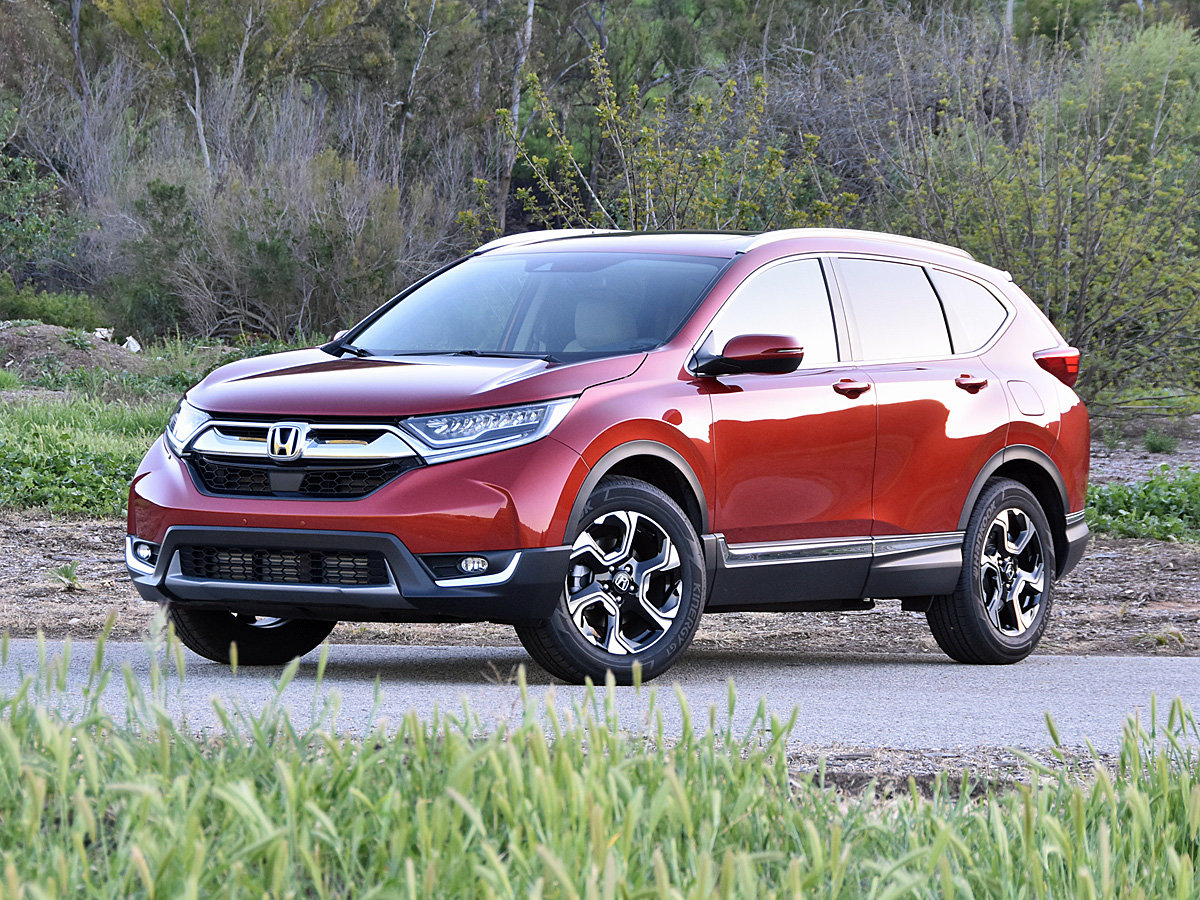
According to CarGurus experts, the overall rating for the 2019 Honda CR-V was 8.0 out of 10, while the 2020 Volkswagen Tiguan scored 7.7 out of 10. Given these ratings, the 2019 Honda CR-V comes out as the slightly superior choice. With its combination of interior space, advanced safety features, fuel efficiency, and overall value, it edges out the Tiguan, making it the recommended option for those seeking a reliable and family-friendly compact SUV.
Choose the 2019 Honda CR-V if:
- You prioritize a spacious and well-crafted interior with ample cargo room.
- Advanced safety features are important and you prefer them to be standard on most trims.
- Fuel economy and responsive performance are key factors in your decision.
Choose the 2020 Volkswagen Tiguan if:
- You need a compact crossover with the flexibility of a third-row seat.
- A high-quality and responsive infotainment system is a top priority.
- You want a roomy and comfortable interior that feels larger than its competitors.
CarGurus highlights

According to CarGurus experts, the overall rating for the 2019 Honda CR-V was 8.0 out of 10, while the 2020 Volkswagen Tiguan scored 7.7 out of 10. Given these ratings, the 2019 Honda CR-V comes out as the slightly superior choice. With its combination of interior space, advanced safety features, fuel efficiency, and overall value, it edges out the Tiguan, making it the recommended option for those seeking a reliable and family-friendly compact SUV.
Choose the 2019 Honda CR-V if:
Shop Now- You prioritize a spacious and well-crafted interior with ample cargo room.
- Advanced safety features are important and you prefer them to be standard on most trims.
- Fuel economy and responsive performance are key factors in your decision.
Choose the 2020 Volkswagen Tiguan if:
Shop Now- You need a compact crossover with the flexibility of a third-row seat.
- A high-quality and responsive infotainment system is a top priority.
- You want a roomy and comfortable interior that feels larger than its competitors.

By: CarGurus + AI
At CarGurus, our team of experienced automotive writers remain at the heart of our content operation, conducting hands-on car tests and writing insightful guides that are backed by years of industry experience. To complement this, we are harnessing AI to make our content offering more diverse and more helpful to shoppers than ever. To achieve this, our AI systems are based exclusively on CarGurus content, ratings and data, so that what we produce is both unique to CarGurus, and uniquely helpful to car shoppers.

